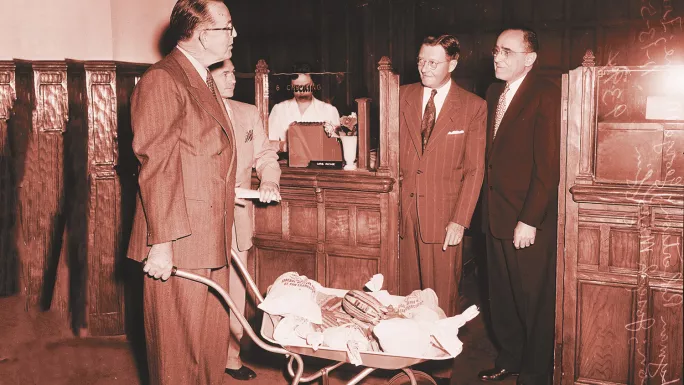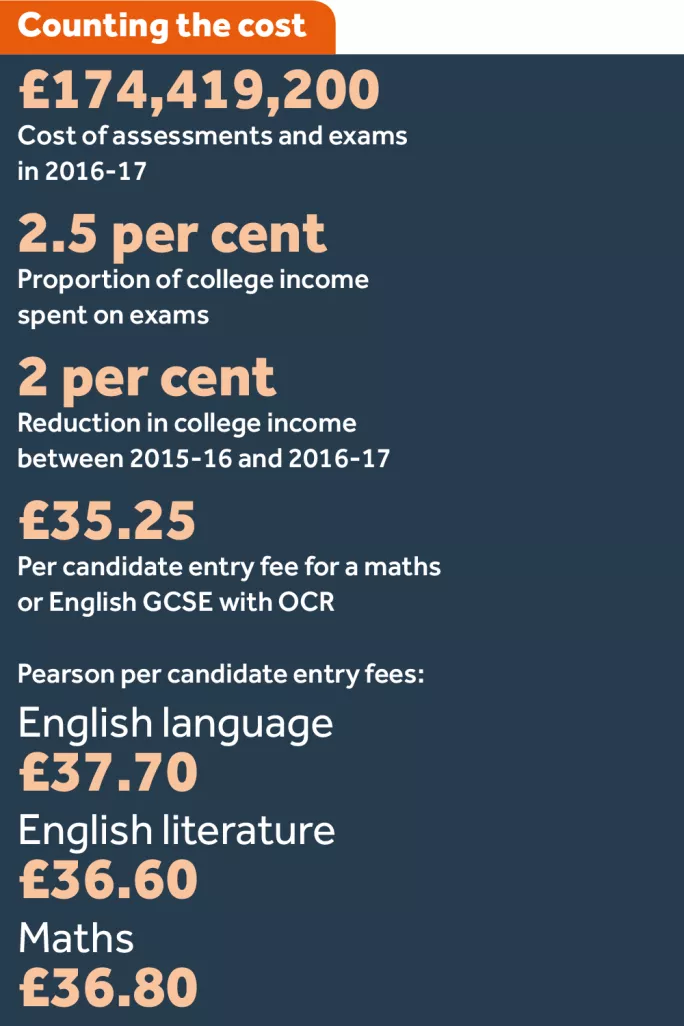The heavy burden of exam reforms on college budgets

The impact of policy change on the further education sector has been well documented - from increased workloads for staff and heightened stress levels for students to the logistical issues that have been created by the GCSE resit policy.
In 2016, when resits became mandatory for students who narrowly missed out on a grade C at school, the number of GCSE English and maths entries in colleges topped 200,000 for the first time - up by 40 per cent from the previous year. That number rose again in 2017.
But policy changes also increase the pressure on another aspect of college finance - the cost of exams. Figures from college annual returns, provided to Tes by the Association of Colleges, show that the cost of assessments and exams to the sector was £174,419,200 in 2016-17.
This represents 2.5 per cent of total income, meaning that £1 in every £40 a college earns is spent on assessment. According to the AoC, that means if the bill was cut by half - for example because there was a reduction in the assessment burden - the roughly £80 million released could pay for 2,000 new FE teachers.
Charges for exams and assessments vary not just between exam boards but also between qualifications and subjects.
This creates a marketplace, with colleges able to “shop around”. OCR, for example, charges a subject fee per candidate of £35.25 for GCSE English language, English literature and maths, while Pearson charges £37.70, £36.60 and £36.80, respectively.
The overall exam cost figure is slightly lower than in the same period the previous year (£188,793,000), but total income dropped by just over 2 per cent. The decoupling of AS levels also contributed to that overall reduction.
‘Outrageous expense’
John Hunt, chief finance officer for the London and South East Education Group, which is spread across four college campuses, says: “Exams are an outrageous expense to FE colleges. This situation is likely to be made even worse with the introduction of T levels, as there will be only one assessment board per qualification - giving those awarded the contracts a monopoly on fees.”
And the cost of the exam itself is not the only financial pressure they create, he adds: “For us, the GCSE burden is huge and has an impact on all our staff and students. We require nearly 300 staff for invigilation and, although we are able to use our own college buildings, we have to close the college to other students to accommodate the wide range of individual needs we have to cater for.”
Ben Verinder is director of Chalkstream, a consultancy that has carried out a number of different research projects looking at how colleges and training providers interact with awarding organisations. He says: “Recent policy changes, from GCSE resits to new [apprenticeship] standards, have created huge amounts of turbulence and that has a negative impact on costs for awarding bodies and those administering exams in colleges and training providers.”
He adds that the sector has cut costs in other areas but has been more reluctant to do it in relation to awarding bodies because matching the right qualification to students’ needs is seen as more important than cost.
“Curriculum managers are given a lot of autonomy in selecting awarding bodies but they don’t always get the support they need in terms of securing economies of scale and negotiating contracts. Inflexible quality processes, particularly in a big college, can sometimes make it very hard to shop around,” he adds.

Julian Gravatt, AoC deputy chief executive, says that exam fees are a big part of English college budgets because there is so much emphasis on external assessment and not much price competition between different awarding bodies. The fees themselves pay for the costs of constant qualification change, he says.
“Appropriate funding and flexibility is required to solve this. Flexibility with exam dates to suit learner and employer needs would be useful but, more importantly, we need to utilise the professional judgement of practitioners to select the appropriate qualification for each learner,” says Gravatt.
Mark Dawe, chief executive of the Association of Employment and Learning Providers, says that while sitting a GCSE will cost more than functional skills qualifications, the cost of the exam is “still a small proportion of the cost compared to actual teaching”. He adds: “Perhaps the hottest issue is the volume of students having to sit the exam at once.
“I would be asking the exam boards what they do to make this as efficient and easy as possible; some can be very rigid with rules and this could cause more problems than a few pence on the fee.”
‘Price determined by the market’
Awarding organisations tell Tes that they aim to provide market-leading specifications and first-class support services that are excellent value for money. They also stress that they offer training for teachers and CPD opportunities in addition to the assessment service itself.
AQA will carry out around 350,000 assessments for the FE sector this year, according to the exam board.
Claire Thomson, AQA’s head of operations, says that, as a charity, the exam board does not profit from fees. “Any money we make over and above the cost of setting and marking the exams, and awarding grades, gets invested back into education through things like our AQA Unlocking Potential mentoring programme, which helps to improve social mobility.”
An OCR spokesperson adds: “We appreciate the challenges for colleges and schools, and are committed to providing value for money for everyone by keeping our fees as low as possible, despite the costs associated with qualification reform.”
A spokesman for Pearson says that it is committed to helping customers in the further education sector provide high-quality vocational qualifications to prepare their learners for future success in the workforce. “We do this through a balance of examinations and ongoing, practical assessments. Fees are based on the cost of developing, delivering and regulating qualifications.”
Tom Bewick, chief executive of the Federation of Awarding Bodies, says that his members “operate in a highly competitive marketplace”. “Price is determined ultimately by the market,” he adds.
“There is no evidence of overcharging colleges and all our members would want to build long-term business relationships with their customers. Part of the equation will always be offering best value for money as well as service quality.”

You need a Tes subscription to read this article
Subscribe now to read this article and get other subscriber-only content:
- Unlimited access to all Tes magazine content
- Exclusive subscriber-only stories
- Award-winning email newsletters
Already a subscriber? Log in
You need a subscription to read this article
Subscribe now to read this article and get other subscriber-only content, including:
- Unlimited access to all Tes magazine content
- Exclusive subscriber-only stories
- Award-winning email newsletters